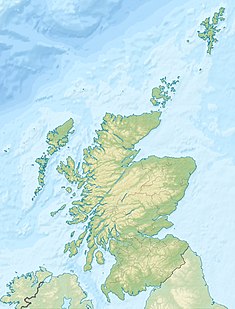Loch Sloy Hydro-Electric Scheme
| Sloy Dam | |
|---|---|
 Sloy Power Station | |
| Country | Scotland |
| Location | Argyll and Bute |
| Coordinates | 56°15′41″N 4°45′49″W / 56.2615°N 4.7636°W |
| Purpose | Power |
| Status | Operational |
| Construction began | 1945 |
| Opening date | 1950 |
| Owner(s) | SSE |
| Dam and spillways | |
| Type of dam | buttressed |
| Impounds | Inveruglas Water |
| Height | 56 m |
| Length | 357 m |
| Spillways | 1 |
| Spillway type | fixed |
| Reservoir | |
| Creates | Loch Sloy |
| Total capacity | 36 million cubic metres |
| Sloy Power Station | |
| Coordinates | 56°15′04″N 4°42′42″W / 56.2512°N 4.7117°W |
| Commission date | 1950 |
| Installed capacity | 152.5 MW |
The Sloy/Awe Hydro-Electric Scheme is a hydro-electric facility situated between Loch Sloy and Inveruglas on the west bank of Loch Lomond in Scotland.
The scheme was conceived by the Edinburgh architects Tarbolton & Ochterlony. Following Matthew Ochterlony's death in 1946, the scheme was progressed alone by Harold Tarbolton.[1]
Construction began in May 1945, under the auspices of the North of Scotland Hydro-Electric Board and was completed in 1949. The official opening ceremony took place on 18 October 1950 and was attended by Queen Elizabeth.[2] The project claimed a new British small tunnelling record January 1951, after a distance of 278ft was bored over a period of seven days.[3]
Historic Scotland has designated the modernist power-station building and the dam as listed buildings of categories A and B respectively.[4][5]
Twenty-one men lost their lives during the construction.[6] The labour force also included some German prisoners-of-war.
The facility is operated by Scottish and Southern Energy, and is normally in standby mode, ready to generate electricity to meet sudden peaks in demand.[7] It can reach full capacity within 5 minutes from a standing start.[8]
References
- ^ "Harold Ogle Tarbolton". www.scottisharchitects.org.uk. Dictionary of Scottish Architects. Retrieved 29 December 2020.
- ^ Her Majesty At Loch Sloy. Pathé News. 23 October 1950. Retrieved 29 December 2020.
- ^ "Tunnelling Record at Loch Sloy. 278ft Bored in Seven Days". The Glasgow Herald. 16 January 1951. p. 6. Retrieved 29 December 2020.
- ^ "SLOY AWE HYDRO ELECTRIC SCHEME, SLOY POWER STATION INCLUDING BOUNDARY WALLS, GATES AND GATEPIERS". Historic Environment Scotland. Retrieved 29 December 2020.
- ^ "SLOY AWE HYDRO ELECTRIC SCHEME, LOCH SLOY DAM". Historic Scotland. Retrieved 29 December 2020.
- ^ "Arrochar, Tarbet and Ardlui Heritage - The Loch Sloy Hydro-Electric Scheme 1950". www.arrocharheritage.com. Arrocher,Tarbet & Ardlui Heritage. Retrieved 19 June 2016.
- ^ "Sloy". SSE. Retrieved 20 April 2014.
- ^ "Power from the Glens" (PDF). SSE. Retrieved 20 April 2014.
External links

